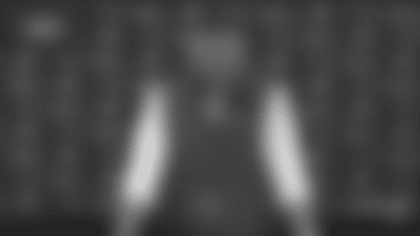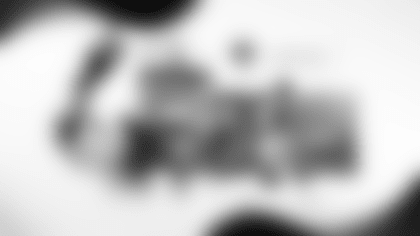**
Q:** What are your thoughts on this defensive matchup with the Cardinals? What scheme are they playing and what challenges do they present?
JM: Well, I had an opportunity to coach against the Cardinals twice last year. Coach [Cardinals Defensive Coordinator Ray] Horton has done a good job of implementing the system that he had at Pittsburgh for a long time. I wouldn't say it's exactly the same, but there are a lot of similarities to it. They're a team that plays a lot of linebackers from their base defense. They give you a lot of different looks. They're a team that I would say has an extensive pressure package. They do a great job of trying to disrupt the passing game with pressure and also at the same time do a good job of affecting the running game, at the same time with those same pressures. They're an aggressive defense, a lot of good players. I think they're a fast team. They have a lot of good team speed on defense. They have guys that make plays at all three levels. Certainly, over the last 10 games they're 8-2 and have done a good job of really settling into what they want to do and they're playing well.
Q: Can you tell us what you like about Stevan Ridley and can he be the kind of guy who can shoulder that kind of load week in and week out?
JM: I thought Stevan did a good job of running hard in the game, made some yards after contact. He converted on some short yardage and goal-line opportunities which are always important plays for the offense. He made positive plays in the passing game as well. Stevan's certainly earned the opportunity that he got on Sunday. I think he made the most of the opportunities he was given in the game. He's a young player that works very hard during course of the week and has really made strides in a lot of different areas of his game and certainly I think some of those helped us on Sunday. We hope to see that continue going forward.
Q: The offense was able to establish a nice balance against Tennessee. How much do you value balance on offense in general? What are some of the positive things that it does?
JM: I think maintaining balance in any portion of the game is important and on offense, certainly, if you're able to do more than one thing well and able to move the ball in different ways, I think it just forces the defense to have to defend a lot of different things in your offense. You can't really settle into one thing and get comfortable with that. When you have a decent balance offensively, your running game can help your play action, your play action can help your running game and then you mix in all the other things you want to try to do. I think it becomes a complementary part of our game. Certainly our goal will always be to try to go in and maintain our balance unless we decide that the best thing to do would be to do something other than that. I know we've done that in certain games in the past, to make a conscious effort or a decision to do it some other way. Right now, we did a decent job in Week 1 and hopefully we can continue to do that by being productive in both the throwing game and the running game.
Q: We saw a bit of a reduction in Wes Welker's snaps. Was that a game-plan type of thing? Are people reading too much into it? What can you tell us about that?
JM: I think the game plan each week is really different. We definitely had some personnel groupings, I don't know how many exact number of snaps, but we played quite a few snaps of three tight ends in the game at the same time. Then we played some two tight ends with two running backs in the game at the same time. Each week, we try to make the decision on what groupings or what personnel matchups may give us, whether it's an advantage or not, we don't know. But we maybe try to quiet the game down a little bit or take advantage of a situation we think we can take advantage of. We kind of decide those on a week-to-week basis. Certainly Wes had some opportunities in the game and made the most of a few of those. Then we had some other opportunities we didn't quite hit. Wes' role is the same as we've always gone. We'll go each week and try to do what we think is best to help us win. Sometimes that may include playing more multiple tight ends. Sometimes it might be playing a lot more receivers. We kind of try to feel that out as we go through our preparation and then make the decisions that go along with it.
Q: In the preseason there were a lot of moving parts on the offensive line. Why do you like Ryan Wendell at center and Dan Connolly at right guard? What did you see there against Tennessee?
JM: I thought the line did a decent job as a whole. Certainly there are areas of improvement in all aspects of our play. We played seven guys in there on Sunday. Donald Thomas played in there. We played Marcus [Cannon] in there as well. Logan [Mankins] and Sebastian [Vollmer] were in there during the course of the game, certainly a big chunk of it, and then we got them out there some. The line went about their job and handled their business the way we expect them to. Wendy [Ryan Wendell] has done a nice job. He's earned the opportunity that he has now. He went in there and provides us with a tough, competitive guy in the middle that does a good job of communicating and getting our calls across the board to the guys up front and he played that way on Sunday. Dan has been a guy that has played a lot of different roles for us. He played guard and fullback the other day. He certainly has played center in the past. The more versatile those guys are, the more they know about the other guy's job and what his role's going to be, certainly the more it helps them do their own job. To have two guys in there that know what's going on at multiple positions can really give us a good balance inside there.
Q: I noticed the Cardinals seem to be pretty effective with their outside the numbers pass defense. What have you noticed there?
JM: They certainly do a good job of mixing up their defenses. They're not one of those teams that gives you the same look multiple plays in a row. They're certainly a well coached team. You can tell that by the way they operate and execute a lot of different calls. They don't make a lot of mistakes. I don't know the exact number, but I know they challenge guys on the outside when they play one-on-one type coverage out there. They have some guys who have played a lot of football the last few years in that system. [William] Gay is certainly familiar with it. [Patrick] Peterson played in it all last year. You have some younger players, [Jamell] Fleming, [Michael] Adams plays inside. They're going to be competitive. They play an aggressive style up front. They pressure quite a bit, which I think always affects any quarterback's accuracy, no matter where he's throwing, because you can get pressure in the pocket. Those numbers, whatever they might be, could be affected by the rush, they could be affected by blitzing, they could be affected by tight coverage and competitive corners. I think all of those things factor into Arizona's defense. When you study them, they do a good job of all those things. They have good players at all three levels. They certainly do a good job of trying to disrupt the quarterback.
Q: What are your thoughts on the no-huddle offense in terms of its place in the NFL today? We've seen it quite a lot here in New England and now it seems like the growth of that has been noticeable. What are your thoughts on that?
JM: Well I think that, I certainly didn't get to see a whole lot of games this weekend. We never really do other than what we're watching on tape. But I do know that are more teams obviously trying to employ that method of playing offense. And there's probably a lot of different reasons for it. Defenses are certainly getting more and more multiple and playing a lot of different personnel packages, trying to throw you a lot different looks and disguise in different coverages, different pressures, bringing people at the quarterback and trying to disrupt the passer in as many ways as they possibly can. Sometimes you feel like you can up-tempo the game and maybe settle some of that down. That might be one area where people look at it and say it's a useful tool. I think that in general terms early in the season, sometimes playing quick is an advantage because these are our first few games that we're playing our first group the entire ball game. Sometimes that can give you an advantage too. It's definitely a fad. I know like a lot of different things, it could come and then it could go. There's certainly different waves of that on both sides of the ball and in the kicking game that show up from time to time and then maybe a few years later they'll kind of go into a different fad. I know in college football there seems to be a lot of that. I think you're seeing some different ways to employ that now in the NFL.






































